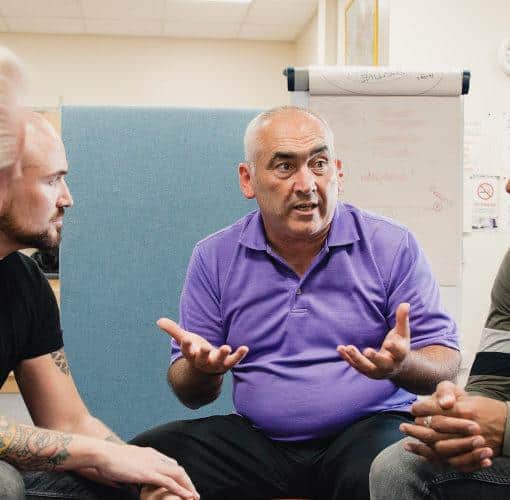By its very nature, family violence work can be hard. We’re often dealing with people who are traumatised and deeply affected by abuse they’ve experienced, or others not wanting to take responsibility for the violence they’ve used, blaming other people or circumstances and railing at ‘the system’.
We’re hearing or reading about some of the most awful experiences many people have had. This is particularly true when working with women and children victims/survivors, but also in working with people who have perpetrated abuse, because we can hear about not just the violence they have perpetrated but also their their own experiences of abuse, sometimes severe. Emotional responses to violence prevention work are normal – and also a risk to workers’ wellbeing. But we sometimes don’t really think about the potential affects the work has on us.
We also don’t often consider that we can sometimes have a personal connection with what we’re hearing and dealing with. When we’re dealing with family violence it can sometimes resonate with our own personal histories and experiences – our families, relationships, children. This can have a visceral effect on us, whether we recognise it or not.
Historically, not all family violence workers have gone to lengths to ensure their own emotional wellbeing, and sometimes that can lead to trouble. Most front-line workers have access to good debriefing and supervision processes – especially people working directly with clients – but others in our organisations might not.
All workers in the family violence sector can be affected by trauma. Research shows anywhere between 30 and 85 percent of workers demonstrate symptoms often related to what’s sometimes called secondary or vicarious trauma, compassion fatigue or burnout. This can include:
- anxiety
- depression
- de‐personalisation
- feeling overwhelmed by emotions such as anger and fear, grief, despair, shame or guilt
- increased irritability
- feelings of reduced personal accomplishment
- procrastination
- low self‐esteem
- having no time or energy for self or others
- increased feelings of cynicism, sadness or seriousness
- an increased sensitivity to violence and other forms of abuse, for example when watching television or a film
- avoiding situations perceived as potentially dangerous
- feeling profoundly distrustful of other people and the world in general
- disruptions in interpersonal relationships
- sleeping problems
- substance abuse
And, these experiences don’t disappear when we clock off our shift. They can often intrude into our personal lives.
Vicarious trauma is often thought of as a water tank. Usually, the tank fills from the top when it rains, and every once in a while the tap at the bottom is opened to release the water. But if the tap isn’t opened, the tank will overflow. Usually, we can’t predict when the overflow will happen – usually we can’t see inside the tank to gauge how full it is or pay attention until it’s too late. This is the experience of vicarious trauma – when things become overwhelming and spill out uncontrollably.
The ‘tap’ is the capacity for workers to either manage their own emotional wellbeing through conscious processing techniques, regular quality debriefing and supervision provided by someone with demonstrated expertise in this work, or both. Good supervisors can teach workers skills to identify when the ‘tank’ is close to overflow and to process potentially damaging feelings and emotions.
Importantly, aside from our own wellbeing, if we’re not actively looking after ourselves, then chances are we might not be doing the best for our clients, others affected by or using violence or our colleagues.
So, what can we do? Think about the instructions passengers get when a plane is about to take-off.
“If the cabin loses air pressure, oxygen masks will drop from the ceiling. Please put on your own mask before assisting others.”
Basically, if we’re not going ok, we might not be able to provide the best responses to others.
Even if we think we’re coping, it’s crucial we have this regularly checked out and perhaps learn some new skills to identify and process the bad stuff.
Think of construction workers. They have numerous rules and regulations to keep themselves and others safe, regardless of how competent and experienced they are, from approved attire to appropriate use of tools, safety equipment and reporting safety concerns. They are trained to collaborate and discuss issues of concern and rely on expert opinion. Family violence workers can do the same. Consider what tools of your trade would be useful to ensure your personal safety and wellbeing, as well as ensuring the work you do is valuable and worthwhile to others.
Be curious about how you’re travelling and ensure your workplace is providing quality debriefing and supervision processes that work for you and all of your colleagues – not just the counsellors – or consider finding a recommended external supervisor.
Take the time to regularly check in with yourself. What’s occupying your mind at the moment? How are you sleeping? Are you avoiding anything? These things might seem trifling. You might want to convince yourself that everything’s okay and you can deal with it. And maybe that’s true. But, it is crucial you get it checked out. Don’t wait for the overflow.
Another response to managing your own wellbeing is to ‘not go there’. These things can sometimes be very affecting – even debilitating. We can sometimes work hard to push things away, bury them. It can sometimes feel just too tough to deal with. Some workers feel that if they told anyone they weren’t really coping it might impact on their future work prospects, or that they might let their clients down if they didn’t just keep doing the work. Thoughts like these can snowball and, if you are experiencing trauma, might not be rational.
And, as family violence workers know, we wouldn’t encourage this approach with our clients, as the repercussions can be devastating, and the ‘tank’ will invariably overflow. Consider what you would be recommending to and discussing with your clients. What do they need when dealing with trauma, even if they don’t immediately recognise it? The same applies for workers.
Invariably, experiences of trauma or burnout don’t get better by being ignored. Such conditions should never be an embarrassment, and if unchecked, can get much worse. And that’s no good for anyone.
If what you’ve just read sounds close to the mark for you, the first step is to talk to someone. Shame, embarassment and feelings of inadequacy can get in the way, so start where it’s safest for you. Here are some options for seeking help:
- a friend or colleague (this can be a good place to start, but in the longer term professional help might be what you need)
- your organisation’s Employee Assistance Program (EAP)
- your clinical supervisor
- your manager
What self-care practices work for you?
- listening to music
- having wind-down practices or a routine between leaving work and coming home
- engaging in something completely different that takes your mind into a more positive and uplifting space – gardening, playing with children, dancing, tai-chi, yoga
- walking barefoot on the grass
- sport, or just walking somewhere pleasant
- doing a mad cookup in the kitchen
- maintaining a healthy diet
- quality time with loved ones and good friends
- something else?
Sometimes feelings of burn-out have their origin elsewhere in your life. If your personal life and relationships aren’t nurturing for you, or if you are dealing with relationship difficulties, there are many things we hear that can trigger emotional responses for us – consciously or unconsciously. Counselling or mental health support is helpful, but as a professional counsellor or human service worker, you might feel embarassed to be the one needing help. Men particularly might experience this – even though we know all about “the man box”, it can still be a piece of work to deal with when it comes up in yourself. Don’t let that stop you seeking help. If you’re concerned about seeking help in your local area because “everybody talks”, consider on-line counselling and support (e.g. via Zoom or Skype) or by telephone.
Compassion, kindness, support and clear boundaries are essential in the work we do – we also need to provide those to ourselves.



